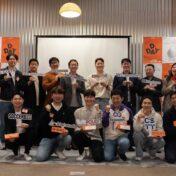There is growing frustration in Korea among the startup community about how large corporations have been ‘stealing’ startup innovations and copying them with their own internal development teams, leaving the original startup teams high and dry. This is not only worrying for the startups involved though, as the products being created by the corporate copy-cats are often merely the next best thing (think Apple-Samsung?).
The companies in the spotlight for this questionable practice are big players, who have the budget to acquire startups, and one would have hoped, the ethics and foresight not to steal innovation from the ‘little guys’.
By way of example, NHN (parent company of Naver, Korea’s biggest search portal) has recently strengthened its mobile services production facilities and one of the results is a celebrity morning alarm call, called ‘Naver Good Morning’. This service is a rip-off of Malang Studio’s ‘Alarm Mon’. Naver have also stolen their idea for ‘Naver Memo’ from Wizard Work’s service, ‘Som Note’.
Another example is South Korean telecoms giant, SK Telecom (through their development function SK PLanet) which has recently copied ‘Buddy Up’, a closed SNS service, from Jelly Coster. The SK Planet’s version is called ‘Mark’.
Another Search Engine, Daum, has been accused of copying ‘Ad Latte’, a mobile marketing platform, with their service ‘Adam’. We Make Price also introduced ‘Panda market’, which has been labeled as a copy-cat of ‘Hello Market’ & ‘번개장터’.
The disadvantages of copying, rather than merging with startups is clearly evident from the perspective of the startups. But there are also disadvantages to consumers, who may not be getting fair access to the better services that are being released by the original developers. Large corporations have the resources to pay to have their (inferior) applications appear higher in the app markets, which stifles the natural and earned growth of the startups creators. This is of course particularly evident for Naver, which has its own app market, and an 80% share of the Korean search market.
The best situation for Korean innovation and consumers is for large corporations to incorporate startups, to leverage their might in marketing and distribution, and let the developers shine.
Comments very welcome on this topic.
Are you a startup that has experienced this situation?
Are from a large corporation, and have another side to this argument?
Do you have any suggestions for startups facing these issues?
Original article in Korean available from ETNews






